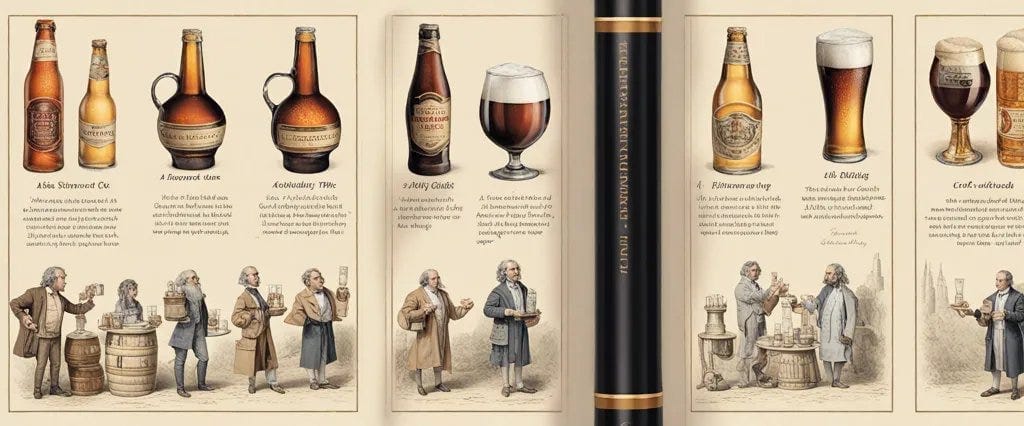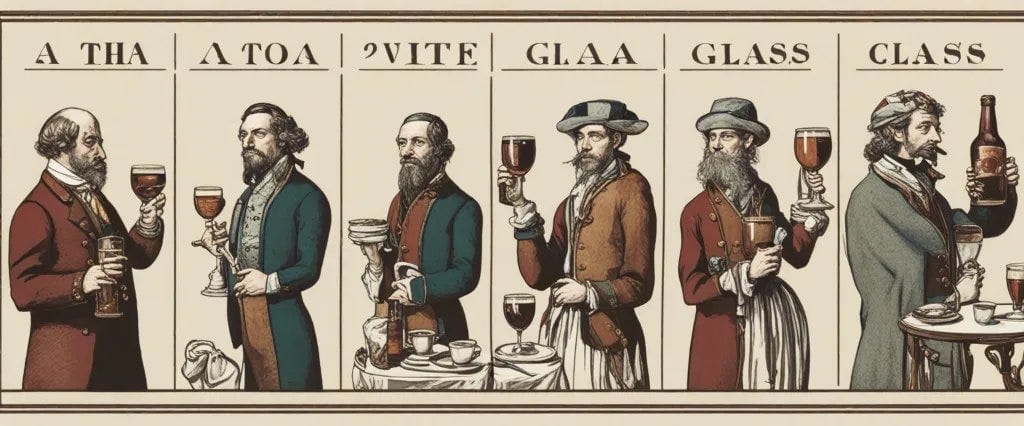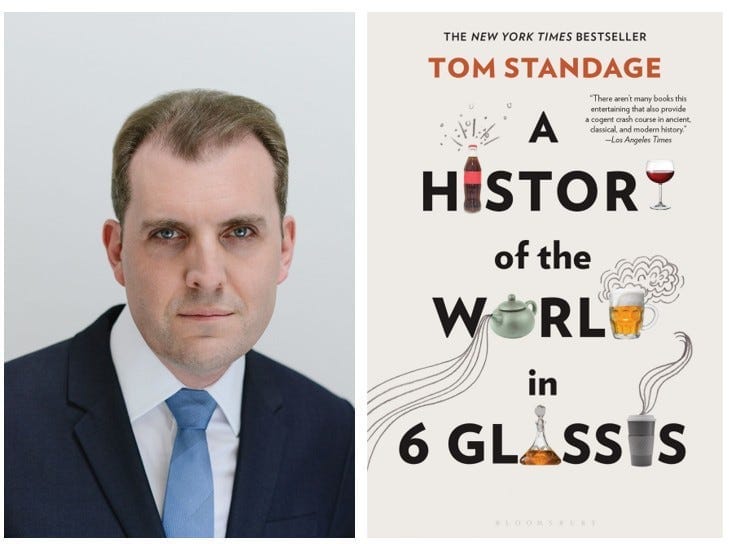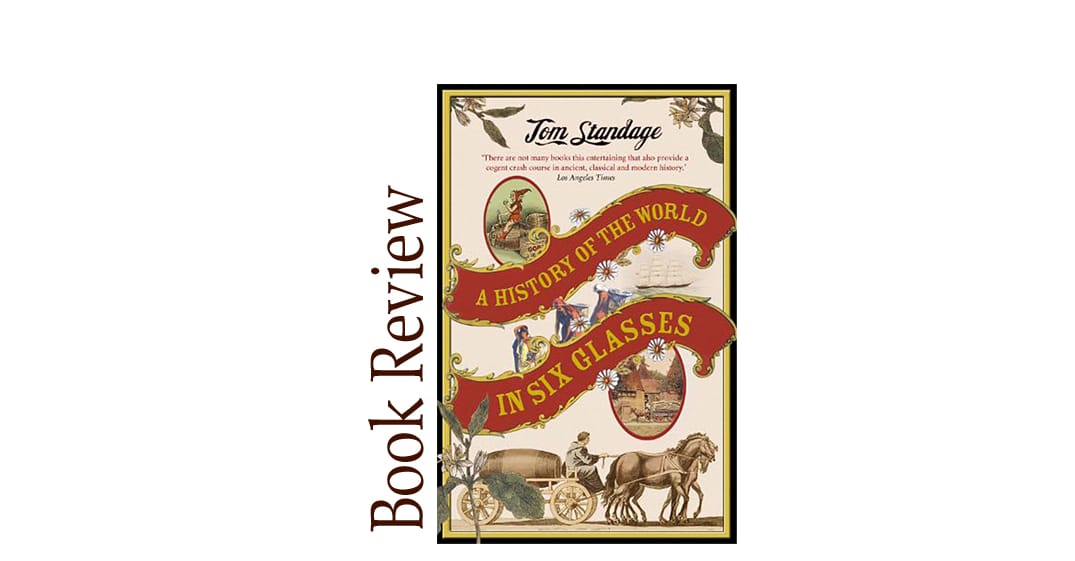- Date Published:
2005 - Length:
336 pages—Listening Time: 7 hr 34 minutes - Genre:
NonFiction, History, Food & Cooking - Setting:
10,000 BCE to Present; Worldwide - Awards:
New York Times Best Seller 2005, Audie Earphones Award for Production 2005 - Languages:
English, Finnish, French, German, Greek, Hungarian, Italian, Portuguese, Spanish, Turkish - Sensitive Aspects:
Transatlantic slavery, subjugation of indigenous peoples, racist oppression, depictions of violent conquest, revolution and war linked to alcoholic spirits, gender exclusion and sexist attitudes in male-only coffeehouse culture, religious and cultural conflicts over alcohol and coffee, global capitalism, portrayals of alcohol abuse - Movie:
Based on the Tom Standage book A History of the World in 6 Glasses, there is a 2024 docuseries of the same name, hosted by Dan Aykroyd. - Recommended for Book Club:
Yes

What's in your glass right now? Coffee? Wine? Maybe it's a little early for the eggnog, but hey—the holidays are sneaking up on us, and if there's one thing this season teaches us, it's that what we drink matters. A lot.
Here's the thing about holiday gatherings: they're basically elaborate excuses to consume beverages we wouldn't normally touch in July. Mulled wine. Hot toddies. That suspiciously strong punch your uncle brings every year. We toast, we sip, we argue about politics, and then we toast again to forget we argued. It's tradition.
But have you ever stopped mid-sip and wondered why we do this? Why does every celebration, every moment of connection, revolve around clinking glasses together?
Enter Tom Standage's The History of the World in 6 Glasses, a book that'll completely change how you look at your holiday beverage lineup. This isn't some dry history tome that'll put you to sleep. It's the story of civilization told through beer, wine, spirits, coffee, tea, and Coca-Cola. Yes, you read that right—Coca-Cola gets a seat at the table alongside ancient fermented grains.
Standage makes a convincing case that these six drinks didn't just quench humanity's thirst—they shaped us. They sparked revolutions, built economies, connected continents, and yes, they've been the centerpiece of celebrations for thousands of years. Your holiday cocktail party? Ancient Mesopotamians would totally understand.
As we head into the season of overindulgence and good cheer, there's something delightfully fitting about reading a book that celebrates humanity's long, complicated, and absolutely fascinating relationship with what we pour into our glasses. It's like the intellectual equivalent of a really good toast—thoughtful, surprising, and guaranteed to make you the most interesting person at the dinner table.
So grab whatever you're drinking (I won't judge), settle in, and let's talk about how beverages built the world.

Ever wondered what your morning coffee and ancient beer have in common? They've both shaped the world you live in today.
Tom Standage's The History of the World in 6 Glasses isn't your typical dusty history book. Instead of dragging you through endless battles and treaties, he tells the entire story of human civilization through six drinks you've probably had in your fridge: beer, wine, spirits, coffee, tea, and Coca-Cola. And here's the kicker—it actually works.

The journey starts around 10,000 BCE with beer, the accidental invention that convinced our nomadic ancestors to settle down and start farming. Because who wants to wander when you've got a steady supply of brew? Beer didn't just quench thirst in Mesopotamia and Egypt—it literally built civilizations, created social hierarchies, and even served as currency.
Then comes wine, the sophisticated cousin that fueled Greek philosophy and Roman expansion. Standage shows how wine shaped trade routes, influenced religion, and became the drink of intellectuals and empire-builders alike.
Fast-forward to the Age of Exploration, and spirits—rum, whiskey, and brandy—become the engine of colonialism and the nightmare of the slave trade. It's a darker chapter, but essential to understanding how the modern world was built.

Coffee gets its own spotlight during the Enlightenment, transforming 16th and 17th-century coffeehouses into hubs of revolutionary thought. Tea follows, driving British imperialism and sparking everything from the Boston Tea Party to the devastating Opium Wars.
Finally, Coca-Cola emerges as America's liquid ambassador, spreading capitalism and globalization in a bottle.
What makes this book brilliant? Standage doesn't just recite facts—he connects the dots between your drink and democracy, between caffeine and the Scientific Revolution. It's history you can taste, and you'll never look at your glass the same way again.

You've probably sipped your morning coffee without thinking much about it. But what if that cup connects you to the Enlightenment, revolution, and the very backbone of modern productivity? That's exactly the kind of delightful revelation Tom Standage serves up in this clever little gem. Here is why you've got to read it.
It's a Book Club Dream
Every chapter practically begs for discussion, from beer's role in settling ancient civilizations to Coca-Cola's spread as a symbol of American capitalism. You'll have more conversation starters than you know what to do with—and isn't that what we're all looking for?
History Goes Down Easy
Forget dry textbooks that put you to sleep by page three. Standage writes like he's chatting with you over (what else?) a drink, turning complex historical events into stories you'll actually want to tell your friends about.
It Honors Your Life Experience
You've lived through decades of coffee breaks, cocktail hours, and tea times—this book gives meaning to all those moments. Suddenly, your beverage choices aren't just personal preferences; they're part of humanity's grand story.
Perfect Bite-Sized Structure
Six drinks mean six distinct sections, so you can read at your own pace without losing the thread. Finished the coffee chapter? Great, take a break. No pressure to marathon through 800 pages of dense prose.
Intellectual Without Being Pretentious
Standage respects your intelligence but doesn't talk down or show off. He assumes you're curious and smart (which you are), making connections between ancient Mesopotamia and modern geopolitics feel perfectly natural.
Familiar Meets Fascinating
We're talking about beer, wine, coffee, tea, spirits, and Coke—beverages you know intimately. But Standage transforms the ordinary into the extraordinary, showing how your afternoon tea habit connects to British imperialism and the Industrial Revolution.
It Spans Continents and Centuries
From the Fertile Crescent to colonial America to modern globalization, this book takes you on a world tour without ever feeling scattered. Each drink serves as a lens into different cultures, eras, and social movements.
Sparks Fresh Perspectives
Ever wonder why coffee houses became hotbeds of revolutionary thinking? Or how rum fueled the triangular trade? These aren't questions you knew you had until Standage answers them brilliantly.
Short Enough to Actually Finish
At around 300 pages, it's substantial without being overwhelming—the Goldilocks length for readers who want depth but also have, you know, other books on their nightstand.
Makes You Sound Smart at Parties
Let's be honest: being able to casually mention how beer led to the agricultural revolution or why tea destroyed China's empire—well, that's the kind of conversational gold that makes you the most captivating person in the room.


Purchase Tom Standage Books
Discover how beer shaped civilization, telegraphs predicted Twitter, and dinner plates reveal empires— Tom Standage transforms the ordinary objects in your cupboard into extraordinary time machines that prove history has been preparing us for the present all along.
Bookshop.org was created as a socially conscious alternative to Amazon, with the goal of helping local, independent bookstores thrive. This is why Readers With Wrinkles supports their efforts. Please join us in this effort by purchasing your next read here.

Ready to get your "geek" on? Here are books similar to The History of the World in 6 Glasses that tell history through the lens of everyday objects and commodities:
- Salt: A World History by Mark Kurlansky
This book explores how salt, the only rock we eat, shaped civilization by influencing trade routes, financing wars, securing empires, and inspiring revolutions, including Gandhi's famous salt march. - Cod: A Biography of the Fish That Changed the World by Mark Kurlansky
A microhistory examining how the Atlantic cod influenced exploration, fed Caribbean slaves, sustained the Union Army, and sparked international conflicts, including wars between the UK and Iceland. - At Home: A Short History of Private Life by Bill Bryson
Using his Victorian parsonage as a framework, Bryson takes readers room by room through domestic history, exploring commerce, architecture, technology, and innovations that shaped modern home life. - The Golden Thread: How Fabric Changed History by Kassia St. Clair
This book weaves together stories of textile discovery and invention from ancient Chinese silk to modern synthetic fabrics, revealing how textiles shaped human culture and civilizations. - The Botany of Desire: A Plant's-Eye View of the World by Michael Pollan
An exploration of how four plants—apples, tulips, marijuana, and potatoes—have shaped human desires and cultures while humans simultaneously influenced their evolution and cultivation. - A History of the World in 100 Objects by Neil MacGregor
This book tells global history through 100 objects from the British Museum's collection, ranging from ancient chopping tools to modern credit cards and solar chargers. - 1491: New Revelations of the Americas Before Columbus by Charles C. Mann
A well-researched microhistory challenging traditional narratives about pre-Columbian Americas, revealing the advanced cultures, population density, and societal structures that existed before European contact. - Fifty Inventions That Shaped the Modern Economy by Tim Harford
This book examines how specific inventions transformed economic systems and daily life throughout history.


Comments